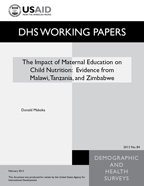
Abstract:
Child malnutrition remains one of the health
challenges that African countries have to
deal with to remain on course to achieve the
health-related Millennium Development Goals
(MDGs). This study analyzes the impact of
maternal education on child nutritional
status in three African countries, based on
data from the Demographic and Health Surveys
(DHS), the 2010 Malawi DHS, with a sample of
4,563 children age 0-59 months; the 2009-10
Tanzania DHS, 4,821 children; and the 2005-06
Zimbabwe DHS, 3,473 children. Bivariate
analyses and the Pearson Chi-square test of
independence were used to test the
association of maternal education and three
measures of child nutrition—stunting,
wasting, and underweight. A survey logistic
regression was employed to assess the
determinants of the three measures and to
examine the relationship between maternal
education and child nutrition.
The results show that in all three countries
the three measures of child nutritional
status significantly decrease with increased
levels of mother’s education. The analysis
also shows that, after controlling for other
factors, maternal education reduces the odds
of the three measures of child nutrition in
all three countries. The threshold level of
maternal education above which it
significantly improves child stunting and
underweight is 9 years of schooling in Malawi
and 11 years of schooling in Tanzania and
Zimbabwe.
The policy implication is that the free
primary education currently offered in the
three countries may not be sufficient to
address child malnutrition. In all three
countries, if maternal education is to play a
significant role in reducing child
malnutrition, women need to be educated
beyond the primary school level. In addition,
offering nutritional education programs for
women, particularly those with low levels of
education, would help them attain better
nutritional outcomes for their children.
 The Impact of Maternal Education on Child Nutrition: Evidence from Malawi, Tanzania, and Zimbabwe (PDF, 505K)
The Impact of Maternal Education on Child Nutrition: Evidence from Malawi, Tanzania, and Zimbabwe (PDF, 505K)
